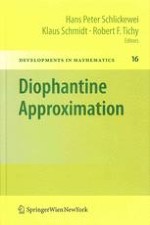2008 | OriginalPaper | Buchkapitel
On the Continued Fraction Expansion of a Class of Numbers
Aktivieren Sie unsere intelligente Suche, um passende Fachinhalte oder Patente zu finden.
Wählen Sie Textabschnitte aus um mit Künstlicher Intelligenz passenden Patente zu finden. powered by
Markieren Sie Textabschnitte, um KI-gestützt weitere passende Inhalte zu finden. powered by
A classical result of Dirichlet asserts that, for each real number ξ and each real
X ≥
1, there exists a pair of integers (
x
0
, x
1
) satisfying
$$ 1 \leqslant x_0 \leqslant X and \left| {x_0 \xi - x_1 } \right| \leqslant X^{ - 1} $$
(a general reference is Chapter I of [10]). If ξ is irrational, then, by letting
X
tend to infinity, this provides infinitely many rational numbers
x
1
/x
0
with |ξ - x
1
/x
0
≤
x
0
- 2
. By contrast, an irrational real number ξ is said to be
badly approximable
if there exists a constant c
1
> 0 suchthat |ξ -
p/q >
c
1
q
- 2
for each
p/q ∈
ℚ
or,equivalently,if ξ has bounded partial quotients in its continued fraction expansion. Thanks to H. Davenport and W. M. Schmidt, the badly approximable real numbers can also be described as those ξ ∈ ℝ \ ℚ for which the result of Dirichlet can be improved in the sense that there exists a constant c
2
< 1 such that the inequalities 1 ≤ x
0
≤
X and
|x
0
ξ
- x
1
|≤
c
2
X
-1
admit a solution (x
0
, x
1
) ∈ ℤ
2
for each sufficiently large
X
(see Theorem 1 of [2]).
